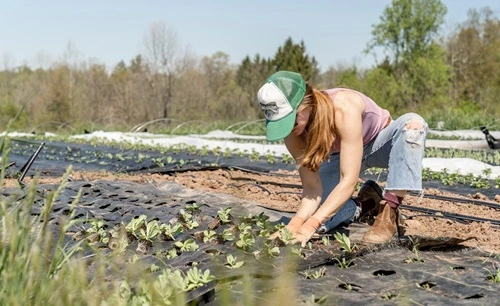Organic farming is an innovative method of agriculture that is poised to change how food is produced. This method of growing food limits the use of synthetic chemicals such as pesticides and fertilizers in farms. Overall, this practice focuses on enhancing soil fertility and maintaining ecological balance.
The importance of organic farming is increasing with the American consumers becoming more eco-conscious. The awareness about health and the desire for sustainable food production is also growing.
According to Statista, organic food sales in the country touched $63.8 billion in 2023. It is an opportunity for cultivators looking to capture a big share of this growing market.
As the current food production system struggles with climate change, soil degradation, and chemical use, organic farming emerges as a sustainable solution.
In this article, we will explain how organic farming offers hope for the future.

Environmental Benefits of Organic Agriculture
The EPA notes that farmers apply chemical fertilizers in their fields to provide nitrogen and phosphorus to crops. However, these nutrients are not always fully utilized by the growing plants. In this case, they can impact air and downstream water quality. Over time, the environmental impact of chemicals becomes profound.
Organic farming curbs the use of chemical pesticides, herbicides, and fertilizers. Rather, it utilizes natural alternatives such as manure, compost, and biological pest control. This absence of harmful chemicals improves soil health by preserving beneficial microorganisms that enhance fertility. Additionally, water quality improves due to less contamination of water bodies.
Also, organic farming methods pave the way for the reduction of carbon footprint. Synthetic fertilizers require energy-intensive production, and reducing their usage makes a difference.
Health Benefits of Organic Foods
A study published by MDPI highlights the health benefits of consuming organic foods for various consumer groups. Multiple statistical analyses show that organic foods have significantly higher levels of nutrients, such as iron, magnesium, and vitamin C. They also contain higher levels of antioxidants compared to their conventionally grown counterparts.
Grown without synthetic herbicides, pesticides, or fertilizers, these foods have lower levels of harmful chemicals. This reduction in chemical residue lowers the risk of exposure to toxins.
These toxins are linked to various health issues, such as certain cancers and hormone disruption. Consumers choosing organic foods can enjoy cleaner produce with fewer health concerns related to pesticide exposure.
Safety for Farmers and Workers
Besides the health benefits for consumers, organic produce is also safer for farmers and workers. According to the UN Environment Program, 11,000 people succumb to the toxic effects of pesticides annually. Farmers are at high risk because they handle these chemicals every day while farming.
Roundup, a popular weedkiller used in farms, has emerged as one of the well-known culprits in this context. The product contains glyphosate, a chemical classified as a probable human carcinogen.
Many American farmers have filed Roundup lawsuits against Monsanto. According to the latest Roundup lawsuit update, there are currently 4,311 lawsuits pending in the Roundup multidistrict litigation.
TorHoerman Law states that victims of Roundup exposure, including farmers and workers, can claim compensation from the manufacturers. The settlement amount can be hefty, considering that the chemical can cause severe diseases like non-Hodgkin’s lymphoma.
Organic farming creates a safer working environment where natural and less hazardous alternatives are used.
Economic Viability and Long-Term Sustainability
While the initial move to organic farming may appear expensive, it is only one side of the picture. The long-term financial benefits can far outweigh these early investments. Moreover, the increasing demand in this segment makes it a lucrative opportunity for farmers. The US Department of Agriculture highlights that the benefit extends to grocers and online vendors as well.
On the farming front, the reduced reliance on expensive fertilizers, pesticides, and herbicides lowers input costs over time. Also, improved soil health leads to more resilient crops and less need for costly interventions. Overall, this can create a sustainable and financially viable farming system.
Another reason that makes organic farming the future of the food industry is the boost it provides to local economies. By encouraging local food production, organic farming benefits small-scale farmers.
Additionally, local organic markets reduce transportation costs and emissions. Organic farms often engage directly with consumers through farmers’ markets, strengthening local food systems and economies.
Climate Change Mitigation
Practices, such as the use of cover crops and no-till farming, help capture and store carbon in the soil. This process is known as carbon sequestration. By minimizing soil disturbance, this method reduces the release of carbon dioxide into the atmosphere. This mitigates climate change by lowering greenhouse gas emissions.
Water conservation is another way in which organic practices reduce the impact on the climate. The use of techniques like mulching and crop rotation improves the soil’s potential to retain moisture. This minimizes the need for irrigation. Also, organic soils are often more drought-resistant due to their water-holding capacity.
Organic farms preserve biodiversity by maintaining habitats for diverse species and promoting ecological balance. With minimal use of synthetic chemicals and pesticides, this method fosters an environment where beneficial insects, birds, pollinators, and other wildlife can thrive. The use of natural pest control methods supports the health of surrounding ecosystems.
Frequently Asked Questions
Q1. How does organic farming increase food production?
Ans: Organic farms have a range of crops to optimize competition among them for nutrients and space. With this, the possibility of low production or yield failure is minimal. Overall, it can increase food production and boost local food security and resilience.
Q2. Why is the demand for organic food increasing?
Ans: Better taste and high nutrient value are probably the reasons for the increase in the demand for organic food. These foods are also good for health as they are grown without the use of harmful chemicals in the form of fertilizers, herbicides, and pesticides.
Q3. What is the future of organic farming?
Ans: As the awareness of the health and environmental impacts of chemical-intensive agriculture grows, more consumers are switching to these products. The demand for nutritious, safe, and ethically produced food is growing. This spells a bright future for organic agriculture.
With the growth in the global population, the need for sustainable food production systems is greater than ever. Organic farming is the ideal solution as it creates healthy food for consumers and makes farms safer for workers.
Also, it supports healthier ecosystems, protects natural resources, and ensures long-term agricultural viability. Without any doubt, it is a future we should work together to build.

